We recommend these books for those interested in learning more about Julian Jaynes’s theory of the origin of consciousness and the bicameral mind.
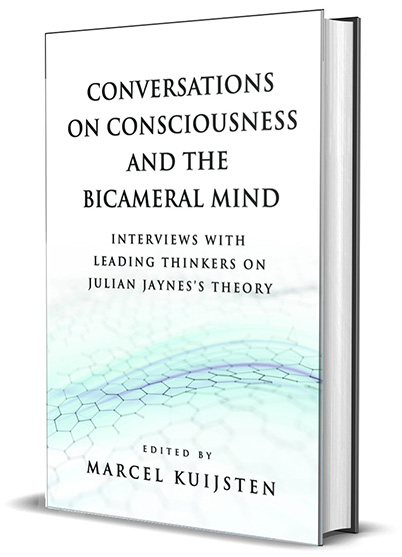
|
Conversations on Consciousness and the Bicameral Mind: Interviews with Leading Thinkers on Julian Jaynes’s Theory
Marcel Kuijsten (ed.) (Julian Jaynes)
How old is consciousness? What is the relationship of consciousness and language? What is the origin of god beliefs and religion? Why do people hear voices that command their behavior? These are just a few of the fascinating questions posed by Princeton University psychologist Julian Jaynes’s influential and controversial theory and discussed in this book. A treasure trove of provocative ideas, Conversations on Consciousness and the Bicameral Mind explains, extends, clarifies, and presents the latest evidence for Jaynes’s theory in a series of highly engaging interviews with both voice-hearers and leading thinkers on the theory.
|
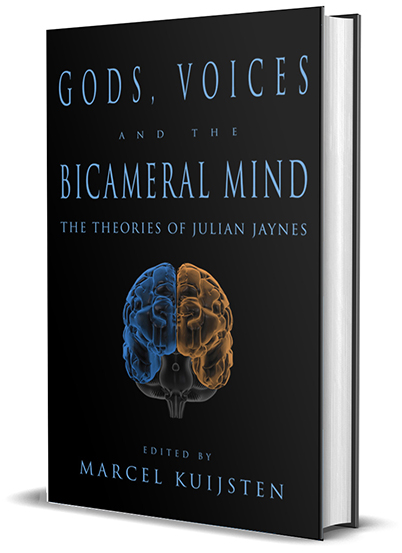
|
Gods, Voices, and the Bicameral Mind: The Theories of Julian Jaynes
Marcel Kuijsten (ed.) (Julian Jaynes Society)
Does consciousness inevitably arise in any sufficiently complex brain? Although widely accepted, this view — inherited from Darwin’s theory of evolution — is supported by surprisingly little evidence. Offering an alternate view of the history of the human mind, Julian Jaynes’s ideas challenge our preconceptions of not only the origin of the modern mind, but the origin of gods and religion, the nature of mental illness, and the future potential of consciousness. The tremendous explanatory power of Jaynes’s ideas force us to reevaluate much of what we thought we knew about human history.
|
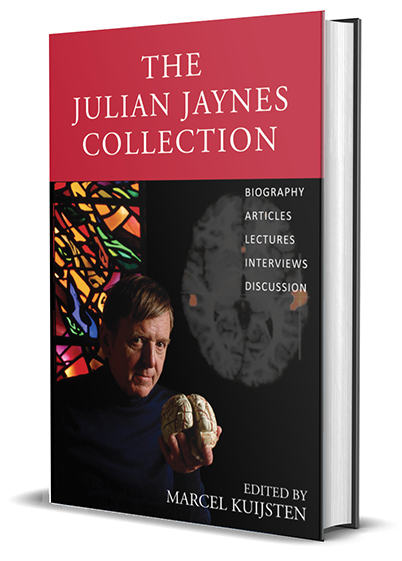
|
The Julian Jaynes Collection
Marcel Kuijsten (ed.) (Julian Jaynes Society)
Princeton University psychologist Julian Jaynes’s revolutionary theory on the origin of consciousness or the “modern mind” remains as relevant and thought-provoking as when it was first proposed. Supported by recent discoveries in neuroscience, Jaynes’s ideas force us to rethink conventional views of human history and psychology, and have profound implications for many aspects of modern life. Included in this volume are rare and never before seen articles, lectures, interviews, and in-depth discussions that both clear up misconceptions as well as extend Jaynes’s theory into new areas such as the nature of the self, dreams, emotions, art, music, therapy, and the consequences and future of consciousness. Expanded to include a new, previously unpublished wide-ranging 30-page interview with Julian Jaynes.
|
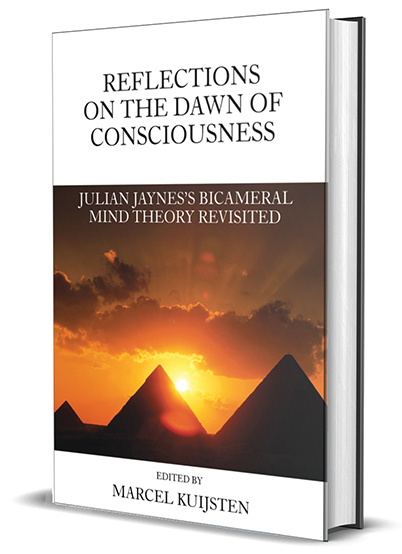
|
Reflections on the Dawn of Consciousness: Julian Jaynes’s Bicameral Mind Theory Revisited
Marcel Kuijsten (ed.) (Julian Jaynes Society)
“In this book Marcel Kuijsten and his colleagues have integrated a quintessential collection of original thoughts concerning Jaynes’s concepts as well as some of Jaynes’s original essays. I have rarely read a manuscript that so eloquently and elegantly examines a complex and pervasive phenomenon. The contributors of this volume have integrated the concepts of psychology, anthropology, archaeology, theology, philosophy, the history of science, and modern neuroscience with such clarity it should be considered an essential text for any student of human experience.”
— from the Foreword by Dr. Michael A. Persinger, Professor of Behavioral Neuroscience, Biomolecular Sciences Program, Laurentian University
|
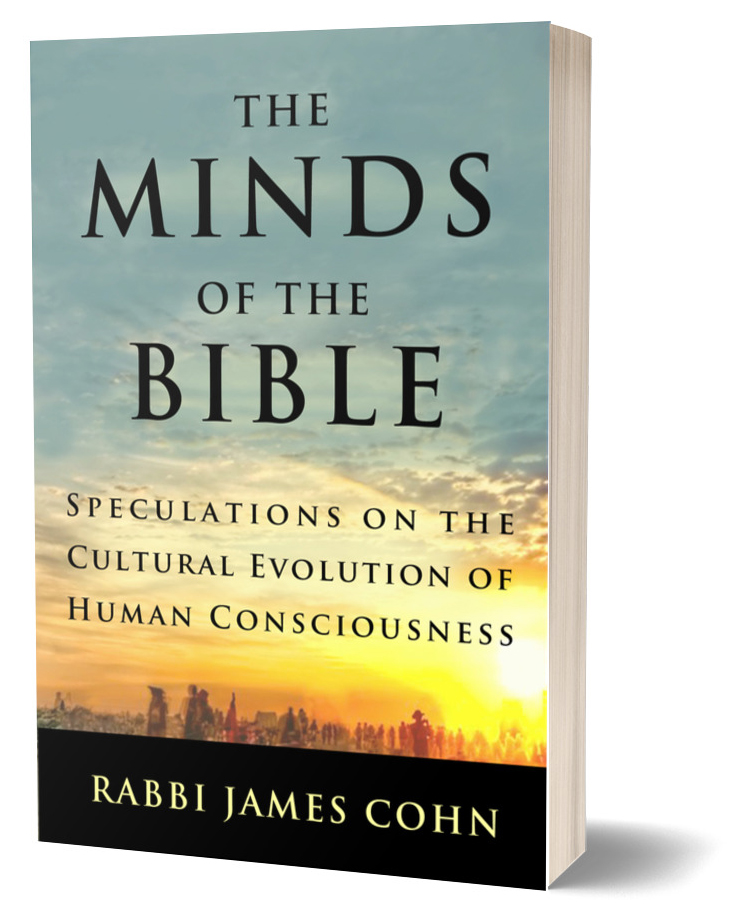
|
The Minds of the Bible: Speculations on the Cultural Evolution of Human Consciousness
Rabbi James Cohn (Julian Jaynes Society)
In 1976, Julian Jaynes hypothesized that as recently as 2,500-3,000 years ago, human beings were non-introspective. Jaynes said that while we are acculturated from infancy on, to understand our mental life as a narratized interior mind-space in which we introspect in a ceaseless conversation with “ourselves,” our ancestors were acculturated to understand their mental life in terms of obedient responses to auditory prompts, which they hallucinated as the external voice of God. Although these “bicameral” people could think and act, they had no awareness of choices or of choosing — or of awareness itself. Jaynes claimed that one could trace this cultural transformation over the course of a scant millennium by analyzing the literature of the Hebrew Scriptures.
|

|
The Origin of Consciousness in the Breakdown of the Bicameral Mind
Julian Jaynes (Mariner Books/Houghton-Mifflin)
At the heart of this book is the revolutionary idea that human consciousness did not begin far back in animal evolution but is a learned process brought into being out of an earlier hallucinatory mentality by cataclysm and catastrophe only 3,000 years ago and still developing. The implications of this new scientific paradigm extend into virtually every aspect of our psychology, our history and culture, our religion – and indeed, our future. In the words of one reviewer, it is “a humbling text, the kind that reminds most of us who make our livings through thinking, how much thinking there is left to do.”
Summary and reviews | Full Text
Translations: French | German | Italian | Korean | Spanish
|
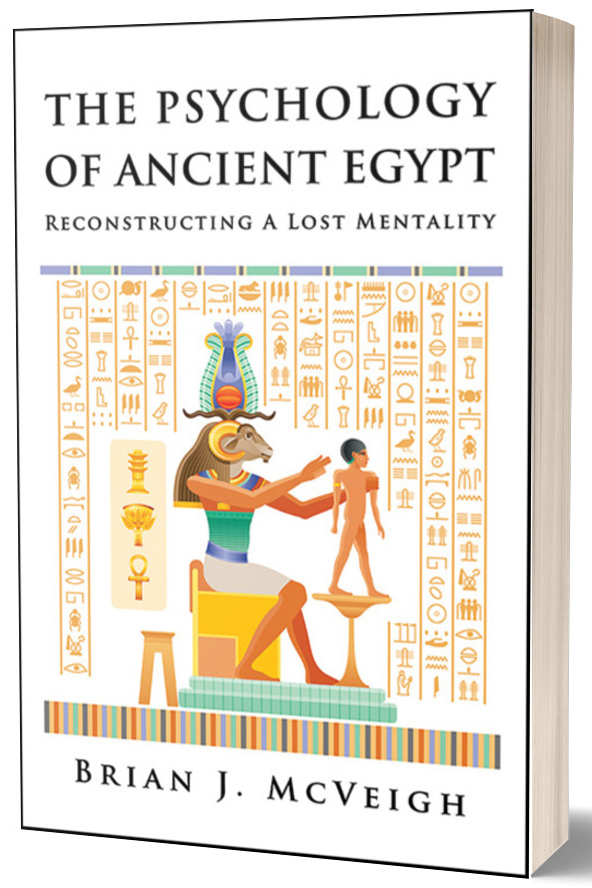
|
The Psychology of Ancient Egypt: Reconstructing A Lost Mentality
Brian J. McVeigh (Julian Jaynes Society)
Building upon Julian Jaynes’s theory of bicameral mentality, Brian McVeigh reconstructs the worldview of ancient Egypt, with its innumerable gods and goddesses, magnificent temples, and monumental mortuary architecture. By surveying the spiritual landscape of glorified ancestors, radiant gods, and a theocentric social order crowned by awe-inspiring pharaohs that lasted for three millennia, McVeigh argues that depictions of supernatural visitations were more than mytho-literary fabrications. Rather, they were recountings of audiovisual hallucinations interpreted as divine guidance. Moreover, the multiple manifestations of the deceased — Kas (spiritual doubles), Bas (human-headed bird body‒souls), and Akhs (transfigured dead) — evidence hallucinated visitations. This book put into scientific perspective the mysteries of this impressive civilization, which continue to fascinate the modern imagination. It also challenges the assumption that human psychology does not change through history and the conventional wisdom of Egyptology, as well as offering lessons about cognitive relativism.
|
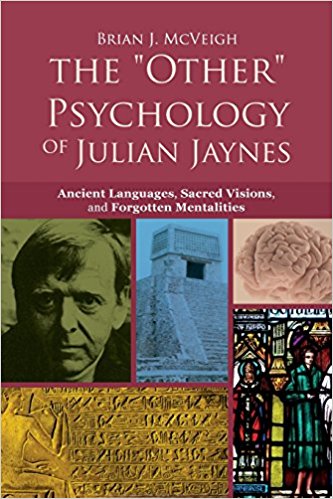
|
The ‘Other’ Psychology of Julian Jaynes: Ancient Languages, Sacred Visions, and Forgotten Mentalities
Brian J. McVeigh (Imprint Academic)
Though often described as boldly iconoclastic and far ahead of its time, Jaynes’s thinking actually resonates with a “second” or “other” psychological tradition that explores the cultural-historical evolution of psyche. Brian J. McVeigh, a student of Jaynes, points out the blind spots of mainstream, establishment psychology by providing empirical support for Jaynes’s ideas on sociohistorical shifts in cognition. He argues that from around 3500 to 1000 BCE the archaeological and historical record reveals features of hallucinatory super-religiosity in every known civilization. As social pressures eroded the god-centered authority of bicamerality, an upgraded psychology of interiorized self-awareness arose during the Late Bronze Age Collapse.
|

|
The Psychology of the Bible: Explaining Divine Voices and Visions
Brian J. McVeigh (Imprint Academic)
The Psychology of the Bible explores how the Old Testament provides perspective into the tumultuous transition from an earlier mentality to a new paradigm of interiorized psychology and introspective religiosity that came to characterize the first millennium BCE. By examining the Old Testament’s historical background and theopolitical context, utilizing linguistic analysis, and applying systems and communication theory, this book interprets biblical passages through a new lens.
|








